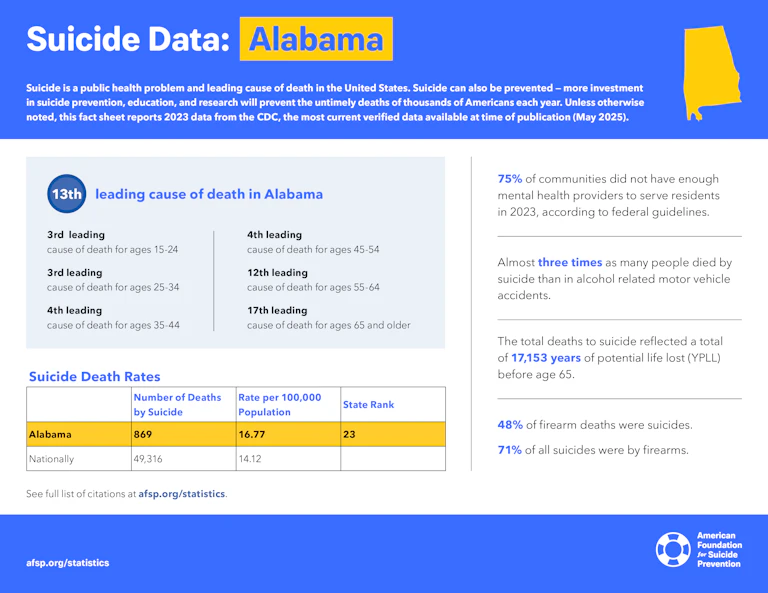Alabama

Alabama suicide prevention plans and initiatives
The Alabama Department of Public Health (ADPH) maintains a suicide prevention webpage. The Alabama Suicide Prevention and Resources Coalition (ASPARC), originally a taskforce created to help the ADPH in suicide prevention strategy, is now a fully-fledged non-profit organization educating people within the state of Alabama in basic suicide prevention techniques and strategies. ASPARC also maintains an online resource directory for suicide prevention and community resources.
Alabama laws
Key:
- Required by law
- Encouraged by law
- No law in place
Crisis lines and 988 implementation
- Addresses 988 infrastructure and provides for telecom user fee
- Addresses 988 infrastructure but does not include telecom user fee
- 988 law limited to creating an exploratory commission, advisory committee, or task force
Mental health parity
- Public health plans (e.g., Medicaid) regularly submit parity compliance analyses to state regulators
- Private health plans (individual and group) regularly submit parity compliance analyses to state regulators
K – 12 school suicide prevention
- Inclusion of the 988 Suicide & Crisis Lifeline and/or other crisis line(s) on student ID cards
- Student allowances for excused mental health absences
- School personnel must report student suicide risk to a parent and/or guardian
- Suicide prevention and/or mental health training for certain school personnel, annual
- Suicide prevention and/or mental health training for certain school personnel, not annual
- Suicide prevention, intervention, and postvention policies/programming
- Student education on suicide prevention
Health professional training in suicide assessment, treatment and management
- Mental health professionals receive regular training
- Mental health professionals receive one time training
- Medical/surgical professionals receive regular training
- Medical/surgical professionals receive one time training
Conversion therapy bans
- Prohibits licensed/board certified mental health providers from engaging in conversion therapy with minors under 18 years of age
- Prohibits licensed/board certified mental health providers from engaging in conversion therapy with vulnerable adults
- Prohibits use of state funds for any purpose related to conversion therapy (e.g., conducting, making a referral for, or extending health benefits coverage for)
University and college campus suicide prevention
- Inclusion of the 988 Suicide & Crisis Lifeline and/or other crisis line(s) on student ID cards
- Students receive information on available mental health and/or suicide prevention services and/or resources
- Adoption of suicide prevention/awareness policy or program
Firearms
- Process for extreme risk protection orders (ERPOs)
- State voluntary do not sell list